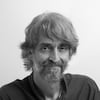Byung-Chul Han, the philosopher who lives life backwards: ‘We believe we’re free, but we’re the sexual organs of capital’
EL PAÍS met with the famous thinker in Berlin. Known for his short sentences, the author of ‘The Burnout Society’ works at night and sleeps during the day
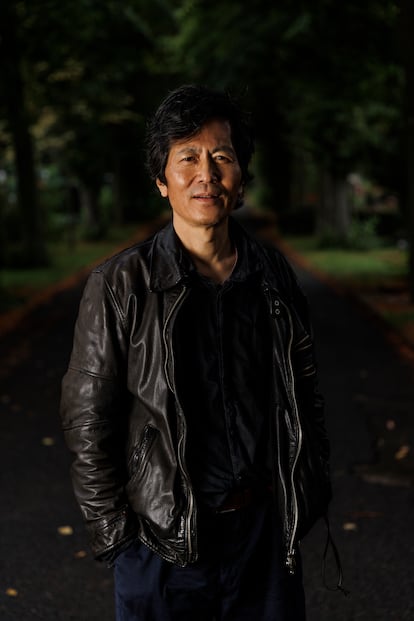
Professor Byung-Chul Han is a 64-year-old man who lives life backwards. He’s awake when people are sleeping, and goes to bed when others are starting to work. A proudly lazy thinker, he writes just three sentences a day. He spends most of his hours caring for his plants and playing pieces by Bach and Schumann on his Steinway & Sons grand piano. For him, these are the things that truly matter in life.
Born in Korea, Han has lived in Germany since the age of 22. A star of contemporary thought, he is best known for The Burnout Society (2015) — a book that captures the zeitgeist of our times. In it, he dissects a society that is totally burned out, filled with exhausted people, who exploit themselves at work and optimize their free time by immersing themselves in their cellphones.
Han — a devotee of slow living — is a somewhat eccentric guy. He does what he wants because he can (he’s been very successful) and because he sees this approach to existence as a political act. The world has chosen the wrong path, and that’s why he goes in the opposite direction.
“The human being lives backwards; he goes in the opposite direction. Simone Weil [the French philosopher, who wrote Waiting for God] says so. [Humans] are violent, they destroy the environment. No animal is violent with nature, except for man. He disturbs what he owes his life to. And how can you escape this upside down life? By living backwards.”
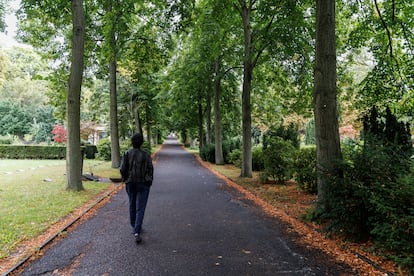
Han arranged to meet with EL PAÍS during a rainy afternoon at the end of August in Berlin.
The Korean-born philosopher has just published The Crisis of Narration, a book in which he argues that, today, narration is indistinguishable from advertising: people and politicians market their lives on social media. It’s all about advertising and self-promotion. He compares storytelling to storyselling — communicating through stories versus selling through stories. Quality doesn’t seem to matter — the important thing is to simply sell whatever you have to offer. We all fall into this: politicians, journalists, social media users… which results in lots of little blurbs without depth. Hence the crisis of narration.
Han is a rather solitary man. He lives in a bubble of his own creation, dividing his time between two houses: an apartment in the southwest of Berlin and a house with a garden between a lake and a forest. He has a smartphone (his anathema), but he barely uses it. He almost never picks up when someone calls. He uses it, he says, to correctly classify the plants in his garden. He doesn’t like mixing with others too much, which is why he grants so few interviews. Before this past August, the last time he spoke to EL PAÍS in-person was in 2014.
The meeting with Han takes place in the Old St. Matthew’s Cemetery, a place where Berliners like to come for a walk. It’s a quiet, green space, with centuries-old trees, long black asphalt paths and purple flowers. Among those who rest here are the brothers Grimm. The cemetery is close to Han’s apartment.
He arrives in a dishevelled state, more than 15 minutes late. He parks his black bike in the cemetery parking lot, his furrowed brow covered in fine droplets of rain. As soon as he greets us — there’s an interpreter present, since Han prefers to speak in German — he decrees (without hesitation) the place where the interview will take place: the terrace of the small cafe in the cemetery.
The rain begins to fall with a little more force. In front of us is a tiny, wet table, a few multicolored chairs and a precarious umbrella, which barely covers the space in which we sit. We all get wet, but Han doesn’t seem to mind.
He orders a coffee, lights a thin cigar and waits — with a grim expression — for the interview to start. He wears a black shirt, a beige belt (half-buckled) and black shoes, whose backs he steps on with his heel, thus transforming them into improvised clogs. From the first moments, he makes it clear that he doesn’t feel like answering questions about his books or his ideas. His books speak for themselves — that’s why he wrote them. They’re meant to be read — he’s not meant to be asked about them.
Uncomfortable with the typical interview format, he embraces his freedom at all times, often choosing what he wants to talk about. He starts by talking about a case of sexual assault that has recently gripped Spain, after star footballer Jenni Hermoso was forcibly kissed by the president of the Spanish Football Federation upon winning the 2023 FIFA Women’s World Cup final.
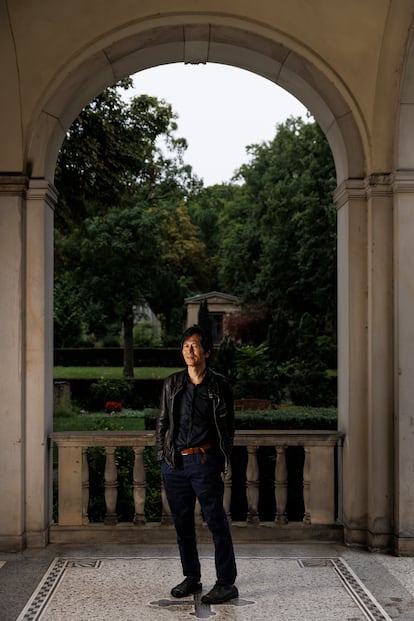
“If I think about a kiss philosophically, that wasn’t a kiss… because he [Rubiales, who has since resigned] kissed her and she didn’t kiss him. That’s violence. This whole #MeToo movement was good. Fighting back against sexual violence is good. But now, this movement against sexual violence has turned into violence. It has destroyed eros, it has destroyed seduction. I know many actresses, who are very independent — and many feminists — who reject this [#MeToo movement], because it destroys seduction.”
He declares that he doesn’t want to be interrupted; he doesn’t want to lose his train of thought. He then starts talking about his pianos. He says that he has three: one in the apartment — the Steinway & Sons — and two Blüthners in the other house. There, he gardens while listening to Bach — he is fascinated by the Goldberg Variations, which he used to teach himself to play the piano — and Schumann. He loves Scenes from Childhood. “I have to play every day, otherwise I get sick,” he sighs. “Even when I travel. That’s why I don’t travel so much.”
Despite his reluctance, he agrees to answer a question about our society, which has lost the patience to listen and to narrate. “People now walk with their ears covered. Since I don’t have a good spatial orientation, when I go somewhere, I ask people where a certain street is, but their ears are blocked by headphones. They cannot hear. This means they’re disconnected from the world, from the other. They only hear themselves speak.”
Han thinks that it’s a mistake to obsess about the freedom of the individual. “Marx already said it: individual freedom is the cunning of capital. We believe that we’re free, but deep down, we just produce, we increase capital. That is, capital uses individual freedom to reproduce. That means that we — with our individual freedom — are the sexual organs of capital.” He brings up one of his flagship ideas: “Under the compulsion of performance and production, there’s no possible freedom. [If] I force myself to produce more, to perform more [and] I optimize myself to the point of death… that’s not freedom.”
He says that he writes little. “I’m extremely lazy. I work in the garden most of the time and play the piano. And then, maybe I sit at my desk for an hour. Maybe I write three sentences a day, which then becomes a book. But I don’t try to write, no. I receive thoughts.” Han waits for the words to come to him. “The ones in the books aren’t mine. I receive the ones that visit me and I copy them. I don’t claim authorship of my books: that’s why the words in them are wiser than I am. Therefore, they have to interview my books, not me. I’m an idiot.”
Despite writing little, as he says, it could be said that Byung-Chul Han publishes a lot. Almost one of his books is released (in German and in translation) every year. Of course, he has based his success on very thin pamphlets, which run between 90 and 120 pages, which he builds out of very short sentences. “He’s mastered the short essay format, he’s turned it into a genre,” says Raimund Herder, Han’s publisher in Spain. The German-born publisher — who is now based in Barcelona — discovered Han at the 2010 Frankfurt Book Fair, picking up a copy of The Burnout Society. While his earlier books sold only a few hundred copies, this essay sold over 100,000 copies in Latin America, Korea, Spain and Italy. However, it hasn’t done nearly as well in Germany, nor in France or the English-speaking world.
Funnily enough, Raimund Herder met Han back in 1988, while he was studying Philosophy at the University of Freiburg. He clearly remembers seeing him in action in Professor Gerold Prauss’ classes — he was the Korean in class “who spoke very excitedly” and asked a lot of questions.
Han arrived in Germany when he was 22-years-old. In Korea, he had studied metallurgy and had to deceive his parents — “they wouldn’t have allowed me to study philosophy” — by telling them that he was traveling abroad to continue his technical studies. “I never saw my parents read a book. I’m a mutation. My father was a civil engineer; he built many dams and subways in Korea.” Germany, furthermore, attracted him powerfully. One day, when he was 16, his mother brought some Bach records home. “While listening to him, I felt that Germany was my spiritual home.”
He also studied philosophy in Paris and had Jacques Derrida as a teacher. However, Han says that his reference thinkers are Emmanuel Levinas, Walter Benjamin (frequently cited in his new book) and Simone Weil, who now apparently lives through him. “Simone Weil has recently moved into me and talks to me all the time. This is no coincidence, because she died on August 24, 80 years ago. She’s still alive and she talks to me, I maintain an internal dialogue with her. I feel like a reincarnation of Simone Weil.”
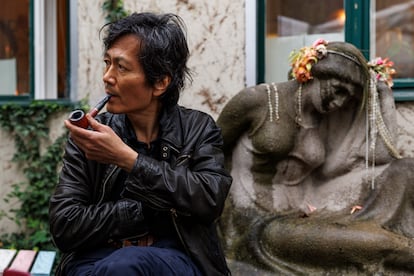
Han has been accused of being too prolific, of going over the same topics over and over again. Wolfram Eilenberger — an essayist and former director of the German version of the magazine Philosophie — tells EL PAÍS that Han reminds him “of a woodpecker, who continually hits a very narrow portion of a very narrow, thick trunk. He found a theme and certainly has a style, which is based on a German that he uses with beautiful simplicity. That being said, I think it’s time for him to change the subject.”
In an article for the academic journal Philosophy, published in July of 2022, Jesús Zamora Bonilla — a professor of Logic and Philosophy of Science in Spain — criticized Han, saying that his books are often not very argumentative (they’re rather categorical) and that they consist of a “juxtaposition of brilliant and short phrases, more typical of [literature and poetry] than philosophical essays.”
Han is aware that he receives criticism. “They say that my thoughts [and my books] are easy to understand. But, for example, Faces of Death is not: you read it and you discover another facet of my thinking, with completely different, complex phrases.” The same thing occurs, he says, with his dissertation, Heidegger’s Heart. “In the past, I wrote differently. I wrote books that were very difficult to read, without thinking about whether they were understandable. But now, for me, [accessibility] is very important. Slavoj Žižek’s books, for example, are totally confusing. Walter Benjamin’s are absolutely incomprehensible… but if you read them 10 times, you’ll understand them.”
After 50 minutes of chatting, Han begins to get impatient and asks, once again, about the photographer, who has been waiting with his assistant in the cemetery chapel, protected from the rain. He comments that he likes to walk in the cemetery and that, on a daily basis, he attends a church that isn’t far from here. He’s a spiritual man. “Yes, I’m Catholic.” Since he lives life the other way around, he goes to pray when people leave Mass. “It’s sad, when I go to church, there are barely 10 people, it’s empty.” He recalls that he studied theology and that some day, he could become a priest. When asked if he’s still considering it, he shrugs. “I can’t rule it out. I live my life backwards. When people leave the Chuch, I enter.”
Han spends a large part of the photoshoot talking to the photographer’s assistant. He doesn’t want to pose, but he allows himself to be photographed while he talks. We walk to the tombstones that belong to the brothers Grimm. He then wanders through the trees, touching the flowers. And, just when it seems like the interview is about to end, he announces that he’s hungry. He suggests that we all go to dinner at an Italian restaurant that he loves, Sale e Tabacchi. It’s very close to the legendary Checkpoint Charlie, the border post that separated the two Germanys during the years of the Cold War.
With a glass of wine in his hand — once the recorder has been turned off — Han appears warm. The distance is gone — he laughs and enjoys himself. He doesn’t like interviews, but he loves chatting casually. He’s quite the joker: when a funny thing occurs to him, he repeats it several times, laughing while nodding his head repeatedly. Relaxed, switching between English and French, he recalls some episodes from his life. By the end of the dinner, he will confirm that he doesn’t have a problem with them being mentioned in the piece.
While tasting a fish soup — one of his favorite dishes — he says that he doesn’t like to cook, that he never eats beef. He always orders two starters in restaurants and reveals that Rioja Gran Reserva is the wine that best helps him sleep. That being said, he doesn’t drink much — “I’m very restrictive” — and he reveals that he hates the word “enjoy.” He also discusses his love of Italy — he’s learning Italian with the help of CDs — and says that he travels to Korea once a year to see his mother. He barely has a relationship with his brothers, while he mentions that his younger sister studies composition.
Night falls in rainy Berlin. The bottle of wine runs out. Han says that, in Korea, he likes to visit the places where he spent his youth. “There, I find the aromas that give me a feeling of home — they make me feel safe. And that’s my home, after all: home is the place where you spend your youth. I rediscover the smells of childhood and that makes me happy. But my spiritual homeland is Germany.”
“And, at this point in your life, what’s German about you? And what’s Korean?”
“If you compare my thoughts to a fruit, the peel and pulp are romantic German. But the pit, no, the pit is that of an exotic fruit.”
Text translated by Avik Jain Chatlani.
Sign up for our weekly newsletter to get more English-language news coverage from EL PAÍS USA Edition
Tu suscripción se está usando en otro dispositivo
¿Quieres añadir otro usuario a tu suscripción?
Si continúas leyendo en este dispositivo, no se podrá leer en el otro.
FlechaTu suscripción se está usando en otro dispositivo y solo puedes acceder a EL PAÍS desde un dispositivo a la vez.
Si quieres compartir tu cuenta, cambia tu suscripción a la modalidad Premium, así podrás añadir otro usuario. Cada uno accederá con su propia cuenta de email, lo que os permitirá personalizar vuestra experiencia en EL PAÍS.
¿Tienes una suscripción de empresa? Accede aquí para contratar más cuentas.
En el caso de no saber quién está usando tu cuenta, te recomendamos cambiar tu contraseña aquí.
Si decides continuar compartiendo tu cuenta, este mensaje se mostrará en tu dispositivo y en el de la otra persona que está usando tu cuenta de forma indefinida, afectando a tu experiencia de lectura. Puedes consultar aquí los términos y condiciones de la suscripción digital.
